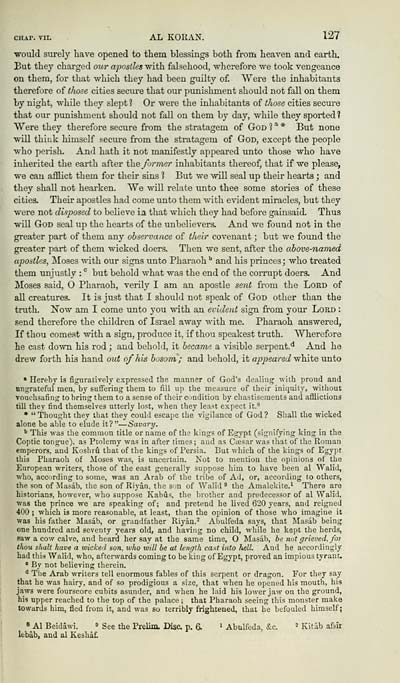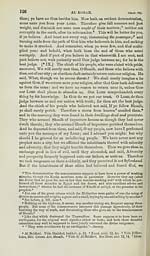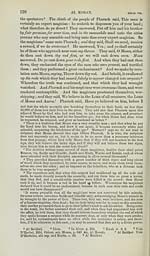Download files
Complete book:
Individual page:
Thumbnail gallery: Grid view | List view

CHAP. vii. AL KOIIAN. 127
•vrould surely have opened to them blessings both from heaven and earth.
But they charged our apostles with falsehood, wherefore we took vengeauce
on them, for that which they had been guilty of Were the inhabitants
therefore of those cities seciu'e that our pvmishment should not fall on them
by night, while they slept ? Or were the inhabitants of those cities secure
that our punishment should not fall on them by day, while they sported ?
Were they therefore secure from the stratagem of God ? '^ * But none
will think himself secure from the stratagem of God, except the people
who perish. And hath it not manifestly appeared unto those who have
inherited the eai-th after the, former inhabitants thereof, that if we please,
we can afflict them for their sins 1 But we will seal up their hearts ; and
they shall not hearken. We will relate unto thee some stories of these
cities. Their apostles had come unto them with e\-ident miracles, but they
were not disposed to believe La that which they had before gainsaid. Thus
will God seal up the hearts of the unbelievers. And we found not in the
greater part of them any observance of tli,eir covenant ; but we found the
greater part of them wicked doers. Then we sent, after the above-named
apostles, Moses with our signs unto Pharaoh'' and his princes; who treated
them unjustly : "^ but behold what was the end of the corrupt doers. And
Moses said, O Pharaoh, verily I am an apostle sent from the Lord of
all creatures. It is just that I should not speak of God other than the
truth. Now am I come unto you with an evident sign from your Lord :
send therefore the children of Israel away with me. Pharaoh answered,
If thou comest with a sign, produce it, if thou speakest truth. Wherefore
he cast down his rod ; and behold, it became a \'isible serpent."* And he
drew forth his hand out of his bosom; and behold, it appeared white unto
» Hereby is figuratively expressed the manner of God's dealing with proud and
ungrateful men, by suffering them to fill up the measure of their iniquity, without
vouchsafing to bring them to a sense of their condition by chastisements and afflictions
till they find themselves utterly lost, when they least expect it.*
♦ "Thought they that they could escape the" vigilance of God? Shall the wicked
alone be able to elude it?" — Savary.
*> This was the common title or name of the kings of Egypt (signifying king in the
Coptic tongue), as Ptolemy was in after times ; and as Caesar was that of the Roman
emperors, and Koshrfi that of the kings of Persia. But which of the kings of Egypt
this Pharaoh of Moses was, is uncertain. Not to mention the opinions of the
European writers, those of the east generally suppose him to have been al Walid,
who, according to some, was an Arab of the tribe of Ad, or, according to others,
the son of Masab, the son of Riyan, the son of Walid » the Amalekite.^ There are
historians, however, who suppose Kal)us, the brother and predecessor of al Walid,
was the prince we are speaking of; and pretend he lived 620 years, and reigned
400 ; which is more reasonable, at least, than the opinion of those who imagine it
was his father Masab, or grandfather Riyan.- Abulfeda says, that Masab being
one hundred and seventy years old, and having no child, while he kept the herds,
saw a cow calve, and heard her say at the same time, O Masab, be nut grieved, foi
thou shalt have a wicked son. who will be at length ca^t into hell. And he accordingly
had this "Walid, who, afterwards coming to be king of Egypt, proved an impious tyrant.
" By not believing therein.
^ Tiie Arab writers tell enormous fables of this serpent or dragon. For they say
that he was hairy, and of so prodigious a size, that when he opened his mouth, his
jaws were fourscore cubits asunder, and when he laid his lower jaw on the ground,
his upper reached to the top of the palace ; that Pharaoh seeing this monster make
towards him, fled from it, and was so terribly frightened, that he befouled himself;
8 Al Beidawi. » See the Prelim. Disc p. 6. > Abulfeda, &c. ' Kitab afsit
lebab, and al Keshafl
•vrould surely have opened to them blessings both from heaven and earth.
But they charged our apostles with falsehood, wherefore we took vengeauce
on them, for that which they had been guilty of Were the inhabitants
therefore of those cities seciu'e that our pvmishment should not fall on them
by night, while they slept ? Or were the inhabitants of those cities secure
that our punishment should not fall on them by day, while they sported ?
Were they therefore secure from the stratagem of God ? '^ * But none
will think himself secure from the stratagem of God, except the people
who perish. And hath it not manifestly appeared unto those who have
inherited the eai-th after the, former inhabitants thereof, that if we please,
we can afflict them for their sins 1 But we will seal up their hearts ; and
they shall not hearken. We will relate unto thee some stories of these
cities. Their apostles had come unto them with e\-ident miracles, but they
were not disposed to believe La that which they had before gainsaid. Thus
will God seal up the hearts of the unbelievers. And we found not in the
greater part of them any observance of tli,eir covenant ; but we found the
greater part of them wicked doers. Then we sent, after the above-named
apostles, Moses with our signs unto Pharaoh'' and his princes; who treated
them unjustly : "^ but behold what was the end of the corrupt doers. And
Moses said, O Pharaoh, verily I am an apostle sent from the Lord of
all creatures. It is just that I should not speak of God other than the
truth. Now am I come unto you with an evident sign from your Lord :
send therefore the children of Israel away with me. Pharaoh answered,
If thou comest with a sign, produce it, if thou speakest truth. Wherefore
he cast down his rod ; and behold, it became a \'isible serpent."* And he
drew forth his hand out of his bosom; and behold, it appeared white unto
» Hereby is figuratively expressed the manner of God's dealing with proud and
ungrateful men, by suffering them to fill up the measure of their iniquity, without
vouchsafing to bring them to a sense of their condition by chastisements and afflictions
till they find themselves utterly lost, when they least expect it.*
♦ "Thought they that they could escape the" vigilance of God? Shall the wicked
alone be able to elude it?" — Savary.
*> This was the common title or name of the kings of Egypt (signifying king in the
Coptic tongue), as Ptolemy was in after times ; and as Caesar was that of the Roman
emperors, and Koshrfi that of the kings of Persia. But which of the kings of Egypt
this Pharaoh of Moses was, is uncertain. Not to mention the opinions of the
European writers, those of the east generally suppose him to have been al Walid,
who, according to some, was an Arab of the tribe of Ad, or, according to others,
the son of Masab, the son of Riyan, the son of Walid » the Amalekite.^ There are
historians, however, who suppose Kal)us, the brother and predecessor of al Walid,
was the prince we are speaking of; and pretend he lived 620 years, and reigned
400 ; which is more reasonable, at least, than the opinion of those who imagine it
was his father Masab, or grandfather Riyan.- Abulfeda says, that Masab being
one hundred and seventy years old, and having no child, while he kept the herds,
saw a cow calve, and heard her say at the same time, O Masab, be nut grieved, foi
thou shalt have a wicked son. who will be at length ca^t into hell. And he accordingly
had this "Walid, who, afterwards coming to be king of Egypt, proved an impious tyrant.
" By not believing therein.
^ Tiie Arab writers tell enormous fables of this serpent or dragon. For they say
that he was hairy, and of so prodigious a size, that when he opened his mouth, his
jaws were fourscore cubits asunder, and when he laid his lower jaw on the ground,
his upper reached to the top of the palace ; that Pharaoh seeing this monster make
towards him, fled from it, and was so terribly frightened, that he befouled himself;
8 Al Beidawi. » See the Prelim. Disc p. 6. > Abulfeda, &c. ' Kitab afsit
lebab, and al Keshafl
Set display mode to: Large image | Transcription
Images and transcriptions on this page, including medium image downloads, may be used under the Creative Commons Attribution 4.0 International Licence unless otherwise stated. ![]()
| Early Gaelic Book Collections > J. F. Campbell Collection > Koran: or, Alcoran of Mohammed > (281) |
|---|
| Permanent URL | https://digital.nls.uk/77137186 |
|---|
| Description | Volumes from a collection of 610 books rich in Highland folklore, Ossianic literature and other Celtic subjects. Many of the books annotated by John Francis Campbell of Islay, who assembled the collection. |
|---|
| Description | Selected items from five 'Special and Named Printed Collections'. Includes books in Gaelic and other Celtic languages, works about the Gaels, their languages, literature, culture and history. |
|---|

